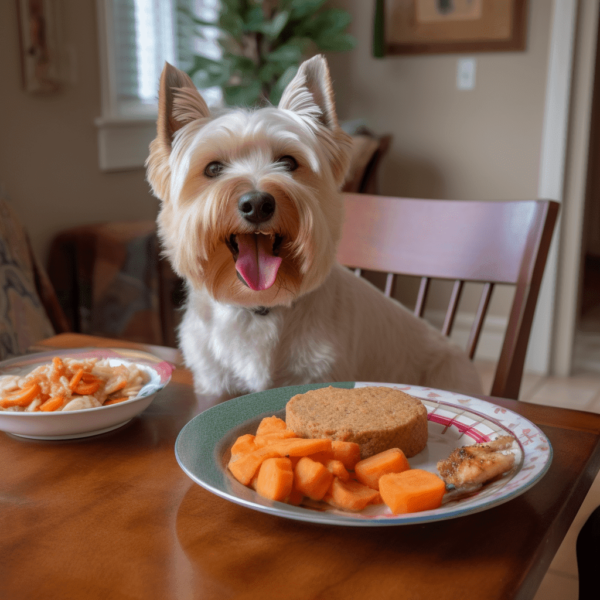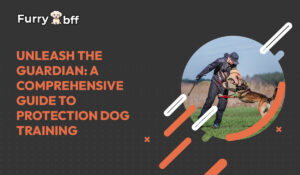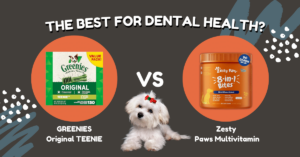The Dangers of Feeding Hypoallergenic Dogs: Unveiling the must Toxic Foods
As devoted pet owners, we always strive to provide our beloved furry friends with the utmost care and attention. However, when it comes to hypoallergenic dogs, who are known to be more susceptible to allergies and sensitivities, we must exercise even greater caution when it comes to their diet. While certain foods may be safe for other dogs, they can pose serious health risks to hypoallergenic breeds. In this article, we will delve into the perilous world of pet nutrition and unveil 20 common foods that are toxic for hypoallergenic dogs, which should be vigilantly avoided at all costs to ensure their optimal well-being.
Chocolate: The Dark and Lurking Danger
Ah, chocolate – the irresistible treat that tempts the taste buds of many. However, for our precious hypoallergenic dogs, this delectable delight can be a grave threat. Chocolate contains a compound known as theobromine that is toxic to dogs, and hypoallergenic breeds may be particularly susceptible to its adverse effects due to their delicate immune system. Even a minuscule amount of chocolate can induce vomiting, diarrhea, seizures, and in severe cases, it can prove to be fatal. So, it’s crucial to keep this tempting treat well out of reach of our hypoallergenic fur babies.
Onions and Garlic: A Fiery Foe
While onions and garlic are staple ingredients in many culinary creations, they can spell disaster for our hypoallergenic dogs. These pungent bulbs contain compounds that can damage red blood cells in dogs, leading to a grave condition called hemolytic anemia. Hypoallergenic breeds may be more vulnerable to this perilous condition, and even a small amount of onions or garlic can cause weakness, pale gums, and breathing difficulties in our precious pets.
Grapes and Raisins: The Sweet but Toxic Temptation
Grapes and raisins, with their natural sweetness, may seem harmless, but they can be treacherous for our hypoallergenic dogs. These innocent-looking fruits are toxic to dogs and can induce kidney failure. Hypoallergenic breeds may have a weakened immune system, rendering them more susceptible to the harmful effects of grapes and raisins. Vomiting, diarrhea, abdominal pain, and decreased urine production are signs of toxicity that should not be ignored in our vigilant care for our precious pets.
Avocado: A Creamy Culprit
Avocado, with its luscious and creamy texture, may be a popular choice for many human meals, but it can be perilous for our hypoallergenic dogs. This seemingly innocent fruit contains a compound called persin, which can be toxic to dogs, especially those with hypersensitivity. Persin can trigger vomiting, diarrhea, and breathing difficulties in dogs. Additionally, the large pit in avocados poses a choking hazard for our furry friends, further emphasizing the need to keep this creamy culprit out of their reach.
Xylitol: The Sneaky Sweetener
Xylitol, a common sugar substitute found in many sugar-free gum, candy, and baked goods, may seem like a harmless sweetener, but it can be a grave danger to our hypoallergenic dogs. This sneaky sweetener can cause a rapid release of insulin in dogs, leading to a perilous drop in blood sugar levels, which can result in seizures and liver failure. Due to their sensitive immune system, hypoallergenic breeds may be more vulnerable to the effects of xylitol, making it imperative to diligently check labels and avoid feeding our pets any food products containing this treacherous sweetener.
Dairy Products: The Digestive Dairy
Oh, the joy of indulging in dairy products! But for our precious hypoallergenic dogs, this joy can quickly turn into distress. Many hypoallergenic breeds are lactose intolerant, meaning they lack the enzyme necessary to break down lactose, the sugar found in milk and other dairy products. Feeding our furry friends dairy products can result in severe gastrointestinal distress, including bloating, gas, diarrhea, and abdominal pain. It can be heartbreaking to see our beloved pets suffer from the consequences of consuming dairy, and as responsible pet owners, we must ensure to keep all dairy products out of their diet to prevent any harm.
Nuts: The Hidden Hazards
Nuts, with their crunchy texture and savory taste, may seem like a healthy snack for humans, but they can be hidden hazards for our hypoallergenic dogs. Certain nuts, such as macadamia nuts and walnuts, can be toxic to dogs and cause a range of symptoms, including vomiting, lethargy, muscle weakness, and tremors. These symptoms can be even more severe in hypoallergenic breeds due to their delicate immune system. It’s crucial to be vigilant and avoid feeding our pets any nuts, and also be mindful of nut-containing products, such as nut butters, which may pose a risk to our furry friends.
Caffeine: The Perilous Pick-me-up
That morning cup of coffee or that tempting piece of chocolate with a hint of caffeine can be a perilous pick-me-up for our hypoallergenic dogs. Caffeine, found in various forms such as coffee, tea, energy drinks, and chocolate, can be toxic to dogs and have adverse effects on their nervous system and heart. Hypoallergenic breeds may be more sensitive to the effects of caffeine, and even a small amount can cause restlessness, rapid heart rate, tremors, and in severe cases, seizures or collapse. It’s crucial to be aware of all sources of caffeine and ensure that our precious pets do not come in contact with this dangerous stimulant.
Raw Eggs: The Risky Treat
While raw eggs may be a popular treat for some dogs, they can pose risks, especially for hypoallergenic breeds. Raw eggs can contain harmful bacteria such as Salmonella, which can cause food poisoning in dogs. Hypoallergenic dogs may have a weakened immune system, making them more susceptible to infections from bacteria like Salmonella. Symptoms of food poisoning from raw eggs can include vomiting, diarrhea, lethargy, and loss of appetite. To ensure the safety of our beloved pets, it’s best to avoid feeding them raw eggs and opt for cooked eggs as a safe alternative.
Salty Foods: The Hidden Dangers
Salty foods may seem innocuous, but they can hide dangers for our hypoallergenic dogs. Excessive salt intake can lead to sodium poisoning in dogs, which can result in symptoms such as vomiting, diarrhea, excessive thirst, and increased urination. In severe cases, it can even cause seizures, coma, or death. Hypoallergenic breeds may be more sensitive to the effects of sodium due to their delicate immune system, and it’s important to avoid feeding them salty foods, including processed snacks, cured meats, and high-sodium condiments.
Artificial Sweeteners: The Sweet Deception
Artificial sweeteners, such as aspartame, saccharin, and sucralose, are often found in various sugar-free or low-calorie products, but they can be a sweet deception for our hypoallergenic dogs. These artificial sweeteners can be toxic to dogs and cause a range of symptoms, including vomiting, diarrhea, abdominal pain, and even seizures. It’s crucial to be vigilant and thoroughly check labels
Heart-wrenching
As a pet owner, it’s heart-wrenching to learn that some foods can pose serious risks to our precious hypoallergenic dogs. These delicate and sensitive breeds can suffer greatly from the consequences of consuming foods that are harmless to humans but harmful to them. It’s our responsibility to protect our furry friends and keep them safe from these hidden dangers.
The thought of our beloved pets experiencing discomfort, pain, or even serious health issues due to our unintentional mistakes is devastating. The joy of indulging in our favorite foods can quickly turn into guilt and remorse when we realize that they can be harmful to our hypoallergenic dogs. The emotional toll of knowing that we may have inadvertently caused harm to our furry family members is overwhelming.
We want the best for our hypoallergenic dogs, and that means being extra vigilant and cautious about their diet. It’s a constant reminder that we need to be aware of every ingredient in their food, treats, and snacks, and to always err on the side of caution. It’s a constant battle between our own cravings and desires, and the well-being and health of our furry companions.
The bond we share with our hypoallergenic dogs is immeasurable, and the thought of them suffering from the consequences of consuming foods that are toxic to them is unbearable. It’s a reminder that we need to be informed, educated, and proactive in making choices that will ensure the safety and health of our pets. It’s a responsibility that weighs heavily on our hearts, as we strive to provide them with the best possible care and love.
We must be their advocates and protectors, making sure that they do not come in contact with any harmful foods. It’s a constant effort to keep them safe and healthy, and it requires careful consideration of every food item that comes into our home. It’s a commitment to their well-being that fills us with deep emotion and a sense of duty to do everything we can to prevent any harm from coming to our precious pets.
In conclusion, the risks associated with certain foods for hypoallergenic dogs are heart-wrenching to comprehend. It’s a reminder of the delicate nature of our pets and the responsibility we have as pet owners to ensure their safety and well-being. With vigilance, education, and careful consideration of their diet, we can protect our furry friends from the hidden dangers of foods that can be harmful to them. It’s a labor of love, driven by our unwavering devotion to our beloved hypoallergenic dogs.
important information about what food is safe for your furry friend and what foods to avoid to keep them healthy and happy.
Q: What food can a hypoallergenic dog eat?
A: Hypoallergenic dogs can generally eat a balanced and nutritious diet that is appropriate for their breed and size. It’s important to consult with your veterinarian to determine the specific dietary needs of your dog based on their individual health requirements.
Q: What are the 10 most toxic foods for dogs?
A: As a responsible pet owner, it’s crucial to be aware of the foods that can be toxic to dogs. Some of the most common ones include chocolate, onions, garlic, grapes, raisins, avocados, alcohol, caffeine, xylitol (a sugar substitute), and certain nuts. These foods can cause serious health issues in dogs, ranging from digestive upset to organ damage, and even death in severe cases.
Q: Can hypoallergenic dogs eat vegetables?
A: Yes, many hypoallergenic dogs can safely eat vegetables as part of a well-balanced diet. However, it’s important to introduce new foods gradually and monitor your dog’s reaction for any signs of allergies or digestive issues. Some vegetables, such as onions and garlic, should be avoided as they can be toxic to dogs.
Q: What food should dogs avoid?
A: Dogs should avoid foods that are high in sugar, salt, unhealthy fats, and artificial additives. Additionally, foods that are toxic to dogs, such as chocolate, onions, grapes, and raisins, should be strictly avoided. It’s best to stick to a balanced and nutritious diet recommended by your veterinarian to ensure your dog’s optimal health.
Q: What foods should be avoided in a hypoallergenic diet?
A: In a hypoallergenic diet for dogs, it’s important to avoid common allergenic ingredients such as beef, chicken, dairy, wheat, and soy. These ingredients are known to trigger allergies in some dogs, including hypoallergenic breeds. Instead, opt for alternative protein sources and carbohydrates that are less likely to cause allergies, such as novel proteins like venison, lamb, or fish, and gluten-free grains like rice or quinoa.
Q: Do hypoallergenic dogs need special food?
A: While hypoallergenic dogs may not necessarily need special food, it’s important to choose a balanced and nutritious diet that meets their specific dietary requirements. It’s best to consult with your veterinarian to determine the most appropriate food for your hypoallergenic dog based on their individual needs, health conditions, and potential food allergies.
Q: Can hypoallergenic dogs eat eggs?
A: Eggs are generally considered safe for most dogs, including hypoallergenic breeds, as they are a good source of protein and essential nutrients. However, some dogs may have allergies or sensitivities to eggs, so it’s important to monitor your dog’s reaction and consult with your veterinarian if you notice any signs of discomfort or digestive issues.
Q: Is chicken OK for dogs with allergies?
A: Chicken is a common allergen for dogs and may trigger allergies in some dogs, including those with hypoallergenic breeds. If your dog has a known allergy to chicken or shows signs of allergies after consuming chicken-based products, it’s best to avoid it and consult with your veterinarian for alternative protein sources.
Q: What meat is hypoallergenic for dogs?
A: Hypoallergenic meats for dogs are typically novel protein sources that are less likely to cause allergies. Examples of hypoallergenic meats for dogs include venison, lamb, and fish. These alternative protein sources can be a good option for dogs with food allergies or sensitivities
Q: What meat should I feed my dog with allergies?
A: If your dog has known allergies to common meats like chicken or beef, it’s important to work closely with your veterinarian to determine the best alternative meat options. Novel protein sources like venison, lamb, or fish may be suitable for dogs with allergies. Feeding a meat that is hypoallergenic for your dog can help reduce the risk of triggering allergic reactions and promote better overall health and well-being.
Q: Is cheese hypoallergenic for dogs?
A: Cheese is not typically considered hypoallergenic for dogs, as it is a dairy product and can be a common allergen. Dogs with known allergies to dairy or lactose intolerance should avoid cheese, as it can cause digestive issues and discomfort. It’s best to consult with your veterinarian for suitable alternatives if you are looking for hypoallergenic options for your dog.
Q: Is salmon good for dogs with allergies?
A: Salmon is often considered a healthy protein source for dogs, but it may not be suitable for all dogs with allergies. Some dogs may have allergies to fish, including salmon, which can cause adverse reactions such as skin irritations, digestive issues, or respiratory problems. If you suspect your dog has allergies, it’s best to consult with your veterinarian to determine the most appropriate protein sources for their specific needs.
Q: What proteins are dogs most allergic to?
A: The most common protein allergens for dogs are typically beef, chicken, and dairy products. These proteins can trigger allergic reactions in some dogs, leading to symptoms such as skin irritations, gastrointestinal upset, and respiratory issues. However, it’s important to note that every dog is unique, and allergies can vary from one individual to another. Consulting with your veterinarian and conducting allergy testing can help determine the specific proteins your dog may be allergic to.
Q: Is Sweet Potato good for dogs?
A: Sweet potatoes are often considered a healthy and nutritious option for dogs. They are a good source of fiber, vitamins, and minerals. However, like any food, sweet potatoes should be introduced gradually and in moderation to your dog’s diet to avoid digestive upset or potential allergies. It’s always best to consult with your veterinarian to determine the appropriate amount and frequency of sweet potatoes or any other food in your dog’s diet.
Q: Is beef or salmon better for dog allergies?
A: It depends on your dog’s specific allergies and reactions. Some dogs may be allergic to beef, while others may have allergies to fish, including salmon. It’s important to work closely with your veterinarian to determine the best protein source for your dog with allergies. Novel protein sources like venison, lamb, or rabbit may also be suitable options for dogs with allergies. Identifying and avoiding the specific allergens in your dog’s diet is crucial for managing their allergies and promoting their health.
Q: Is fish OK for dogs with allergies?
A: Fish can be a healthy protein source for dogs, but it may not be suitable for all dogs with allergies. Some dogs may have allergies to fish, including salmon, which can cause adverse reactions. If your dog has known allergies or sensitivities to fish, it’s best to avoid it and consult with your veterinarian for alternative protein sources that are safe for your dog.
Q: Is fish good for hypoallergenic dogs?
A: Fish can be a good protein source for hypoallergenic dogs, as it is often considered a novel protein that is less likely to cause allergies compared to common protein sources like beef or chicken. However, it’s important to monitor your dog for any signs of allergies or sensitivities, even with hypoallergenic diets. Working closely with your veterinarian to determine the appropriate diet for your hypoallergenic dog is essential for their overall health and well-being
Q: Why can’t dogs eat salmon every day?
A: While salmon can be a healthy protein source for dogs, it is not recommended to feed it to dogs every day. This is because salmon, like any food, should be a part of a balanced and varied diet for dogs. Feeding the same type of protein every day can increase the risk of developing allergies or sensitivities over time. It’s important to provide your dog with a diverse range of protein sources to promote optimal nutrition and reduce the risk of dietary-related health issues.
Q: Is chicken or salmon better for dogs?
A: Both chicken and salmon can be healthy protein sources for dogs, but the best choice depends on your dog’s specific needs, preferences, and any known allergies or sensitivities. Chicken is a more common protein source in many commercial dog foods and is usually less expensive, while salmon is often considered a novel protein that may be beneficial for dogs with allergies or sensitivities to common proteins. However, it’s crucial to work closely with your veterinarian to determine the most suitable protein source for your dog’s individual requirements.
Q: Are most dogs allergic to salmon?
A: While salmon is not considered a common allergen for dogs, some dogs may have allergies or sensitivities to fish, including salmon. Just like with any food, dogs can have individual reactions, and it’s important to monitor your dog for any signs of allergies or sensitivities, such as skin irritations, digestive issues, or respiratory problems, when introducing or feeding salmon. If you suspect your dog has allergies, consulting with your veterinarian and conducting appropriate allergy testing can help determine the best diet for your dog’s specific needs.
Q: Which fish is best for dogs?
A: When it comes to fish, the best option for dogs may vary depending on their individual needs and any known allergies or sensitivities. Fish such as whitefish, herring, and sardines are often considered healthy options for dogs as they are rich in omega-3 fatty acids, which can promote skin and coat health. However, it’s essential to consult with your veterinarian to determine the most suitable fish option for your dog’s specific requirements and to ensure a balanced and nutritious diet.
Q: What seafood can dogs not eat?
A: While some seafood can be a healthy addition to a dog’s diet, there are certain types of seafood that are not safe for dogs to eat. Seafood such as raw fish, shellfish, and high-mercury fish like tuna should be avoided as they can pose risks of bacterial contamination, digestive upset, or mercury poisoning. It’s important to research and consult with your veterinarian to determine which seafood is safe and suitable for your dog’s diet.
Q: What is the healthiest meat for dogs?
A: The healthiest meat for dogs depends on various factors such as your dog’s individual needs, preferences, and any known allergies or sensitivities. High-quality, lean meats such as chicken, turkey, beef, lamb, and venison are often considered healthy options for dogs as they are rich in protein and essential nutrients. However, it’s important to ensure that the meat is cooked thoroughly, free from bones, and fed in appropriate portions as part of a balanced and nutritious diet tailored to your dog’s specific requirements.
Q: Is rice good for dogs every day?
A: Rice can be a good source of carbohydrates for dogs and can be included in their diet in moderation. However, it’s important to note that dogs are primarily carnivorous animals, and their dietary requirements are different from humans. While rice can be beneficial for dogs with certain health conditions or digestive issues, feeding it every day may not be necessary or ideal for all dogs. It’s best to consult with your veterinarian to determine the most appropriate and balanced diet for your dog’s specific needs.









